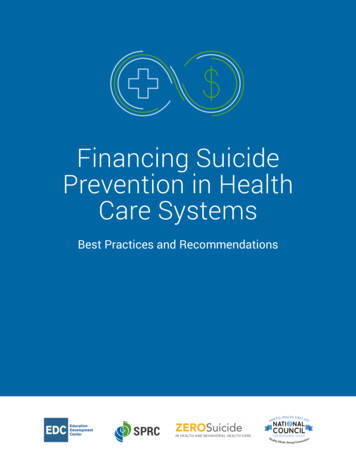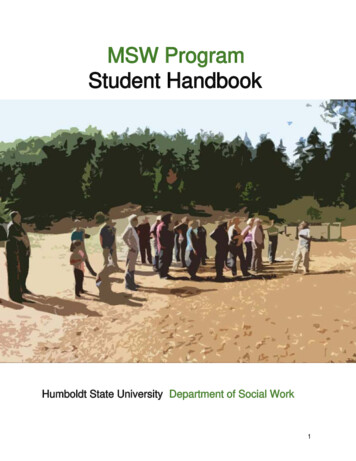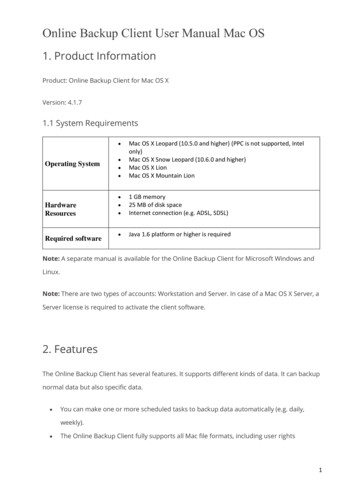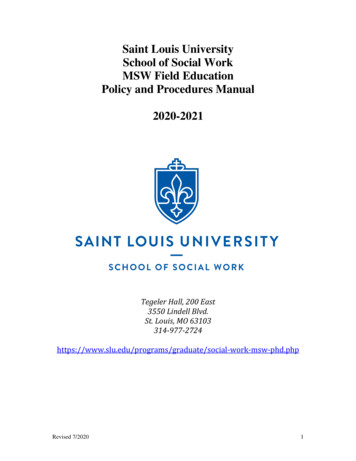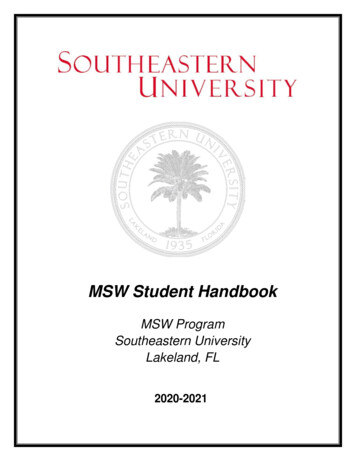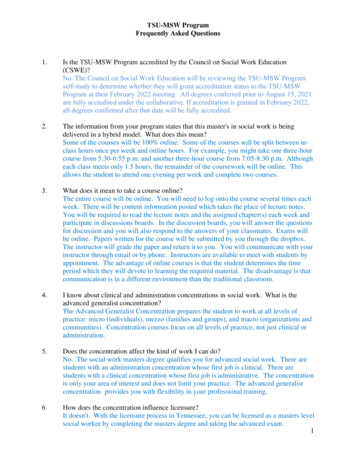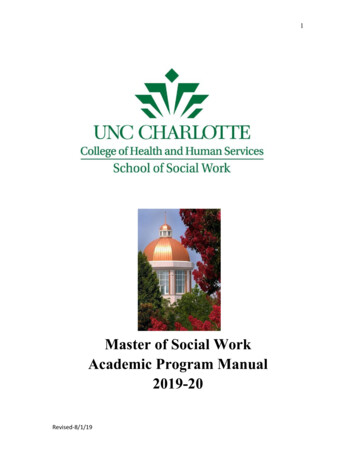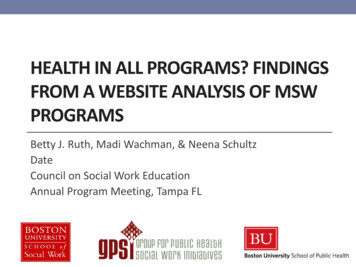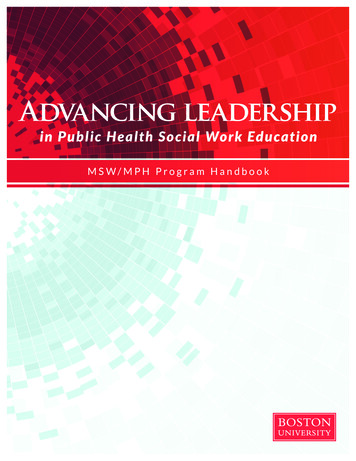
Transcription
Advancing leadershipin Public Health Social Work EducationMS W/ MPH Program Han db o ok
INTRODUCTIONWelcome to the MSW/MPH Program Handbook, a project of the BostonUniversity Advancing Leadership in Public Health Social Work Education grant,funded by the Health Resources and Services Administration (HRSA). This Handbookprovides current and prospective Master of Social Work/Master of Public Health(MSW/MPH) program administrators and educators with useful information on how tobuild and strengthen these valuable dual-degree programs. With 45 MSW/MPHprograms currently in existence across the country, and more under development,MSW/MPH programs are popular and prolific throughout the United States.The BU-ALPS team is passionate about MSW/MPH education. Led by a longtimedirector of the successful Boston University MSW/MPH Program, our team iscomprised of MSW/MPH and MPH graduates, all of whom have practiced at theintersection of public health and social work. Together, we share a deep commitment toquality improvement in these important dual-degree programs, whose value is yet to befully recognized by their broader fields.In developing the Handbook, the BU-ALPS team engaged in a variety of efforts to betterunderstand the current state of MSW/MPH education including:§surveying MSW deans, MSW/MPH Program faculty and directors, APHAmembers, and other key informants on their views of the strengths, needs, andchallenges of MSW/MPH education;§conducting website reviews to gather information about existing programs; and§interviewing a select set of public health and social work experts and keyinformants.Through these efforts, we gained a better understanding of the unique successes andchallenges faced by MSW/MPH programs. No handbook can address all of thesechallenges or feature all of the strengths of the nation’s many programs. Instead, wehave endeavored to speak to some of the discernible common themes related toimplementing, administering, and sustaining MSW/MPH programs, while providingtools and resources that may be helpful to all.1
We believe that MSW/MPH education is an essential method for educating the nextgeneration to address current and future health challenges. We hope that the Handbookwill encourage and promote ongoing improvement in these unique and valuable programs.This Handbook contains current information on existing programs; shared wisdom on howto build, strengthen, and sustain high quality MSW/MPH Programs; and examples of howMSW/MPH graduates are integrating social work and public health approaches inpractice. As a “living document,” we welcome your suggestions for future content. Ourteam wishes you good luck in developing, sustaining, and participating in high-qualityMSW/MPH programs, and is grateful for your work to advance the field of public healthsocial work.Sincerely,Betty J. Ruth, MSW, MPH, Principal Investigator, BU-ALPSMadi Wachman, MSW, MPHAlexis Marbach, MPHJamie Wyatt Marshall, MSW, MPHNandini S. Choudhury, MSW, MPH Candidate2
A CKNOWLEDGEMENTSThe MSW/MPH Program Handbook was made possible by a cooperative agreementfrom the Health Resources and Services Administration (HRSA) of the U.S. Departmentof Health and Human Services (HHS) under grant number G05HP31425. We wish toacknowledge our Project Officer, Miryam Gerdine, MPH, and her colleagues for theirsupport throughout this initiative. This project has also been supported by Sara (Sally)Bachman, Director of the Center for Innovation in Social Work and Health at theBoston University School of Social Work, Impact Marketing Communications, AbtAssociates, and numerous public health social work colleagues and students whoparticipated at each stage of the initiative. We are particularly grateful to BostonUniversity School of Social Work doctoral student Rachel John, MSW, MPH, andBoston University School of Social Work Associate Professor Geoff Wilkinson, both ofwhom made significant contributions to this handbook. The ongoing work of the Groupfor Public Health Social Work Initiatives informs much of the content as well; we aregrateful for the continuing commitment of its members. Finally, the American PublicHealth Association’s Public Health Social Work Section, with its deep dedication topublic health social work, has hosted yearly MSW/MPH program roundtables toprovide technical assistance to MSW/MPH Program participants and educators. Muchof the inspiration for this document came from those conversations with MSW/MPHprogram administrators and students at those meetings. Special thanks to all who havehelped with this project, near and far.U SINGTHISH ANDBOOKThis Handbook includes an overview of the history, current strengths, and existingchallenges associated with MSW/MPH Program education, as well as resources to helpyou in your own efforts to promote, improve, and evaluate your program. Weencourage you to adapt the tools and instruments for your own purposes.S UGGESTED C ITATIONRuth BJ, Wachman MK, Marbach AV, Marshall JW & Choudhury N. AdvancingLeadership in Public Health Social Work Education (ALPS) initiative, Boston UniversitySchool of Social Work. Advancing Leadership in Public Health Social Work Education:MSW/MPH Program Handbook. 2019. Available at: http://ciswh.org/project/bu-alps3
Table of ContentsIntroduction . 1Acknowledgements . 3Using this Handbook . 3Suggested Citation . 3Why Focus on MSW/MPH Programs? . 5History and Overview of MSW/MPH Programs . 10Origins of MSW/MPH Programs . 10MSW/MPH Programs Today . 12MSW/MPH Program Structure and Requirements . 14Concerns Regarding MSW/MPH Programs . 17Literature on MSW/MPH Education. 18Conclusion . 20Building and Sustaining MSW/MPH Programs: Components and Considerations . 21In the Beginning: Tell Your Story! . 21Our story: Ruth Cowin and the Boston University MSW/MPH Program . 21Online Purpose Statements . 24Identifying and Solidifying Support . 27Identifying Components and Navigating Logistics within Your University System . 29Recommendations for Improving MSW/MPH Programs . 32Resources . 37Handout: A Brief Overview of Public Health Social Work . 38Handout: How to Tell if an MSW/MPH Program is Right for You? . 42General Advising Guide: Advising MSW/MPH students . 45Syllabus: Model MSW/MPH Program Integrative Seminar . 54Description of Session Objectives, Readings, and Assignments . 63Integration Tools: Exercises to Promote Public Health Social Work Integration . 68Profiling MSW/MPH Alumni . 71Social Work and Public Health Organizations . 80Contact Information for U.S. MSW/MPH Programs . 82Example of MSW/MPH Program Guidelines . 88MSW/MPH Program FAQs . 96Appendices .101Glossary . 102References. 1064
Why Focus onMSW/MPH Programs?There are many reasons to elevate the conversation about MSW/MPH education at this time. Numerous factorsand challenges are driving professions to assess their impact on major health issues in our society and to adapttheir approaches. A brief review of four important drivers of change in the U.S. health landscape—current context,emergence of interprofessional education, new ways of collaboration, and the call to leadership—can help tounderscore the potential and promise of MSW/MPH programs and their importance to both fields. After discussingeach driver, we address the particular role that MSW/MPH programs can play in addressing the issue.Context: By any measure, we are in a profound moment of change within the U.S. health and social welfarelandscape. The delivery of health services occurs in a fragmented system that emphasizes disease treatment overprevention, uses a maze of bureaucratic structures to contain spiraling costs, and fails to meet the needs of asignificant portion of the population (Marshall, Ruth, Sisco, Cohen & Bachman, 2011). Meanwhile, considerableuncertainty accompanies recent efforts to roll back the health reforms and funding associated with the AffordableCare Act (ACA), whose future remains unclear. The nation’s ongoing health challenges include worsening nationalhealth statistics; rampant health inequities; pervasive chronic and persistent infectious diseases; and increases insubstance misuse, gun violence, and suicide. There are health challenges associated with population aging,immigration, urbanization, environment degradation, and climate change. All of these are exacerbated by cutbacksin social and health funding (Ruth, Marshall & Wachman, 2017). All professions and fields are called to engage in afrank reckoning of the circumstances and resources at hand to address these major population level concerns.Role of MSW/MPH Programs: Social work has an important role to play in improving the nation’s health. Roughlyhalf of all social workers work in health settings; over the next 10 years, it is projected that 70% will be employed inhealth (BLS, 2018). Social work is well-known for its multifaceted clinical activities in health, including carecoordination, medical social work, and behavioral health. Social work’s wide-lens or “upstream” practices inprevention, health promotion, health advocacy, and public health social work (PHSW), although longstanding, areless widely appreciated. However, recent work on the development of a Social Work Health Impact Model(SWHIM), based on the work of Frieden (2010), demonstrates the strength and diversity of social work practiceacross health. The SWHIM illustrates the value of widening the lens to both educate and practice for greaterpopulation health impact (Ruth, Wachman, Marshall, Backman, Harrington, Schultz & Ouimet, 2017). MSW/MPHprograms are key tools in supporting “wide-lens” public and population health education and can help to promote acollaborative high-impact social work response to major health challenges (Ruth et al., 2017).5
Social Work in Health Impact ModelSimilarly, the field of public health, charged with assuring and protecting the health of society, is engaged inmultidimensional collaborative practices across professions, government, voluntary organizations, and othersectors to meet the complex needs of a rapidly changing society. A broad and disparate field comprised of manyprofessions and practitioners, public health has long included social workers in its ranks (Ruth, Sisco, & Marshall,2016; Schneider, 2014). As the field prepares to meet new contextual challenges, a stronger emphasis on social andeconomic determinants of health has emerged (DeSalvo, O’Carroll, Koo, Auerbach, & Monroe, 2016). Public healthand social work, two fields concerned about unmet social needs, are building upon their history of longstandingcollaboration to create new linkages. MSW/MPH programs offer educational and professional syntheses that canhelp practitioners engage in powerful collaborations.Interprofessional education and practice: The recent growth in interprofessional and transdisciplinary approacheshas affected all areas of the health system. Interprofessional education (IPE), as defined by the World HealthOrganization, is “two or more professions learn about, from, and with each other to enable effective collaborationand improve health outcomes” (Gilbert, Yan, & Hoffman, 2010). Recent cross-profession efforts, such as theInterprofessional Education Collaborative, view IPE as central to reducing fragmentation in health systems andstrengthening patient care (Interprofessional Education Collaborative, 2018). The focus on IPE has evolved fromrecognition that complex health challenges cannot be solved by any one profession. Health is multi-dimensional andthe U.S. health system is deeply complex; thus, the solutions must be multifaceted. Some of the U.S. health system’sinefficiencies relate to the “silo-ing” effect. This is in part a reflection of payment and reimbursement models incontemporary health system, an aspect that can be partly remedied by a deliberate focus on IPE (Addy, Browne,Blake, & Bailey, 2015). The ACA unleashed a number of initiatives to promote care coordination and integration, allof which rely upon health professionals and workers learning new ways of practice. IPE training has emerged as keytool for promoting integration efforts across health care.6
Role of MSW/MPH Programs: MSW/MPH programs are, by their nature,successful efforts at IPE. They provide existing fertile ground upon which tobuild new IPE opportunities, preparing students for a world in whichpractitioners must bridge disciplines and sectors (Addy et al., 2015;Ziperstein, Ruth, Clement, Marshall, Velasquez & Wachman, 2015).MSW/MPH graduates are involved in numerous types of interprofessionalleadership and collaborations in hospitals, accountable care organizations,integrated behavioral health, and community settings.Collaboration between public health and social work: Historically, socialwork’s deep roots in public health date back to both fields’ ProgressiveEra origins, when social workers and public health officers successfullycollaborated on key public health issues such as infant mortality,A diverse group of professionals exemplifies anIPE approach in Preventing the School-to-PrisonPipeline: An Innovative Collaboration betweenSocial Work, Legal Services, and Public Health,presented at Boston University in April, 2018tuberculosis, child welfare, and housing (Ruth & Marshall, 2017). At onetime, social work and public health were seen as vitally connected.Although over the course of nearly a century public health and social workhave diverged in many ways, the two fields still share common values andgoals, such as a mutual commitment to improving quality of life, achievingsocial justice, and engaging in interventions that address the socialdeterminants of health (Ruth & Marshall, 2017). Public health and socialwork collaborate on a broad array of issues, from suicide, violence,homelessness and HIV, to substance use disorders, reproductive health,and issues related to the social determinants of health. While the fieldsshare common elements, the distinctions between them are what makeMSW/MPH programs relevant and attractive.Role of MSW/MPH Programs: MSW/MPH education provides animportant pathway for sustaining the integrated practice of PHSW and forexpanding the interface between the two fields for greaterinterprofessional impact. The tools of public health (e.g. prevention, health“The fields of social work and publichealth are inseparable, and no artificialboundaries can separate them. Socialwork is interwoven in the whole fabric ofthe public health movement, and hasdirectly influenced it at every point.”– Harry Hopkins, 1926Franklin D. Roosevelt (left) with HarryHopkins, Library of Congress, Prints &Photographs Division, LC-USZ62-12803promotion, epidemiology, biostatistics) are vital to social work’s efforts topromote health equity and social justice. At a time when public health is emphasizing the need to address unmetsocial needs that impede health, social work provides deep and enduring connections to community-basedpractice in every domain of health and social welfare (Ruth & Marshall, 2017). The cooperative cross-schoolrelationships needed for MSW/MPH programs can serve as scaffolding for further collaboration on joint researchand projects relevant to the interconnected goals of both fields. The graphic on the following page offers somegeneral observations on the common ground and distinctive features of each field.7
Common Ground and Distinctive Features of Public Health and Social WorkPublic HealthSocial WorkSocial justice missionSocial justice missionProgressive era rootsProgressive era rootsOrigins: largely public and governmentalOrigins: voluntary organizationsPredominant focus on prevention andprovision of essential health servicesPredominant focus on interventions for social and clinicalproblems and issues with individuals, groups and familiesUse of social and biological sciences to driveinterventionUse of social sciences to drive interventionEmphasis on ecological models and role ofenvironment in healthEmphasis on “person in environment” approachesEmphasis on resilience and protectivefactorsEmphasis on resilience and strengths perspectiveAddresses social determinants of health andhealth inequities to promote health equityAddresses health disparities to increase justiceHeavily influenced by public and populationhealth modelsHeavily influenced by medical model and “treatment”orientationStrong practice emphasis on scientificallyderived knowledge; emerging emphasis onethicsStrong practice emphasis on values and ethics; emergingcommitment to practice informed researchGoal to promote health and societalconditions that assure healthGoal to advance human well-being and functioning and topromote social justiceLeadership: Much has been written on the need for leadership education in public health and social work programsrespectively; both fields have identified the need for a strengthened workforce and new leadership as the BabyBoom generation moves into retirement (Holosko, 2009; Jadhav, Holsinger, Anderson, & Homant, 2017; Sullivan,2016). Leadership education has been integrated into MPH programs and social work scholars have called for theintegration of leadership into social work education as well (DeSalvo, O’Carroll, Koo, D., Auerbach & Monroe, 2016;Fried, Begg, Bayer, & Galea, 2014; Peters, 2017; Rank & Hutchinson, 2000).Role of MSW/MPH Programs: MSW/MPH education is leadership training; practitioners are cross-trained in andable to broadly integrate both disciplines in response to upstream and downstream health needs. Intentionalactors in social work and public health, MSW/MPH graduates have been described as “ambassadors andtranslators across the two fields and beyond” (Ruth, Marshall, Velasquez, & Bachman, 2015). MSW/MPHprograms have the capacity to produce interprofessional leaders that can serve the interests of both professions8
as they address areas of shared concern. MSW/MPH programs can revitalize the practice of PHSW, which canserve as a unifying framework to support high-impact health social work.Conclusion: These societal drivers provide many good reasons for investing in MSW/MPH education. However,this is not an exhaustive list of all the reasons MSW/MPH programs are needed. Individual schools or jurisdictionsmay have additional rationales, geographic, or even community-specific needs.The University of South Florida’s MSW/MPH Program was developed from a mandate by the Floridalegislature to respond to the public health and social welfare needs of the state, particularly in the arenaof maternal and child health, women’s health and the health needs of mph-and-social-work9
History and Overview ofMSW/MPH ProgramsOrigins of MSW/MPH ProgramsInterdisciplinary higher education is not a new phenomenon; scholars seeking to widen their knowledge havelong engaged in combining studies across fields and areas of inquiry (Miller, Hopkins & Greif, 2008). Theemergence of modern forms of professions in the 19th and 20th centuries led to enhanced graduate professionaleducation, which was, over time, gradually linked to universities. Thus, the development of dual-degree professionaleducation, where two graduate programs join to offer programs of study, is a relatively recent occurrence (Miller etal., 2008). Today, there are many forms of dual-degree education across the professions, linking pharmacy,medicine, public health, social work, law, physical therapy, nursing, and many others.The momentum for building MSW/MPH programs emerged out of several motivations. The 1960s and early 1970swere a period of significant progress in public health and in social work. The post-World War Two economic boomprovided funding for and sparked innovation in health and social welfare. Increases in mid-century federal grantfunding strengthened interest in formalized interdisciplinary sharing of knowledge and skills across fields.Excitement about prevention, particularly primary prevention, generated enthusiasm for public health and socialwork education, encouraging growth in public health programs and generating greater social work interest in publichealth and prevention (Ruth & Marshall, 2017).The first MSW/MPH programs arose out of the spirit of interdisciplinary enthusiasm and optimism thataccompanied the early decades following World War II. These programs provided initial support for crossdisciplinary cooperation between schools and were offered by universities with well-established schools of socialwork and public health, including Boston University, University of North Carolina, University of Minnesota,University of Pittsburgh, and Columbia University.10
However, by the late 1970s, when funding for health,education, and social services was slashed, applications toMSW programs dropped precipitously, and another motivationfor establishing MSW/MPH programs appeared. MSW/MPHprograms emerged as a method for increasing enrollment inincreasingly competitive (and expensive) MSW and MPHprograms (Faherty, 1987). As McClelland observed indescribing the 1977 origins of the University of MinnesotaMSW/MPH Program, “As a marketing device, joint degreesappear to provide a way to attract a diverse, highly committed[student] population to the graduate [MSW] program”(McClelland, 1985, p. 21). While the economics of highereducation drove their development, yet another motive wasPublic health social workers and nurses at the MilkDepot in New York, accessed byhttps://commons.wikimedia.org/wiki/discernable. MSW/MPH programs argued that they could provide graduates with the education necessary fortaking on new roles in a rapidly changing health care system (McClelland, 1985; Ziperstein et al., 2015). While muchhas changed, these strengths continue to drive the development of new MSW/MPH programs.“I could not have planned a better career than the one I have. I chose the MSW/MPH programbecause I wanted a career that allowed for continuous learning, professional growth and freedom. I lovevariety and knew that I would not be satisfied with a career where I did the same thing for 40 years and thenretired. The MSW/MPH program checked off all the things that were important to me. It’s allowed me todelve into areas of interest, master a specific skill set, and use those skills to branch off into something new. Ihave been able to follow that path because I have two degrees that can be used across many disciplines.”– Myrtise Kretsedemas, Alumna, Principal MK Consulting; Founder & Clinician of Perspectives Health Services, LLC, Boston (MA),MSW, MPHStrengths of MSW/MPH ProgramsDraws qualified students: Attractive to diverse, mission-driven studentsCost-efficient: Students can earn two degrees in a shorter period of timePost-graduate success: Graduates report high degree of career satisfaction and employment opportunities inwidely diverse arenasGood for social work profession: Programs support social work’s connection to public health methods andcontinuing development of high impact public health-informed social workGood for public health field: Programs strengthen public health’s connection to social work, enabling greaterdepth in addressing social determinants of health, social justice, and unmet social needs across social systemsPromotes transdisciplinary collaboration: Foster cooperation and understanding between schools of socialwork and public health11
MSW/MPH Programs TodayGeneral interest in dual-degree education is popular insocial work; roughly a third of the nation’s MSW programsoffer them. MSW/MPH programs are especially popular,reflecting the history of ongoing collaboration between thetwo fields (Ruth & Marshall, 2017; Ziperstein et al., 2015).Today, there are 45 programs in the U.S., with others underdevelopment.“MSW/MPH education was a perfect fit formy career aspirations, which are to break downbarriers to care, increase equity, and work with thosewho have been disproportionately affected by racism,income equality and lack of access to basic needs. Ifeel (and felt) that the MSW/MPH program would armme with both the “soft” and “hard” skills to tackle largeand small problems on a daily basis.”-Valerie Tobia, Alumna, Director of Counseling and HealthServices, Wheaton College, Norton (MA), MSW, MPH“My memory of my MSW/MPH trainingand education is that I had fun. I trulyenjoyed my classroom and field placementexperiences, made friends that I will have for alifetime, and gained transferable skills that Icontinue to use in my career today.Theimportance of the integration of public health andsocial work is so clear, so logical to me, that I don’tunderstand why anyone would choose just one! Aneducation in public health provided me with thetechnical skills to understand and use data, take apopulation health and systems approach toproblem solving, and focus on preventionupstream. An education in social work layered onthe elements of social determinants of health,community empowerment and organizing; it alsogave me a firm understanding of the systemicopp
Role of MSW/MPH Programs: MSW/MPH programs are, by their nature, successful efforts at IPE. They provide existing fertile ground upon which to build new IPE opportunities, preparing students for a world in which practitioners must bridge disciplines and sectors (Addy et al., 2015; Ziperstein, Ruth, Clement, Marshall, Velasquez & Wachman, 2015).

